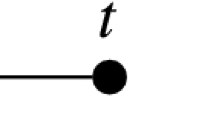Abstract
We develop intuitionistic public announcement logic over intuitionistic \({\textbf{K}}\), \({{\textbf{K}}}{{\textbf{T}}}\), \({{\textbf{K}}}{{\textbf{4}}}\), and \({{\textbf{S}}}{{\textbf{4}}}\) with distributed knowledge. We reveal that a recursion axiom for the distributed knowledge is not valid for a frame class discussed in [12] but valid for the restricted frame class introduced in [20, 26]. The semantic completeness of the static logics for this restricted frame class is established via the concept of pseudo-model.
Similar content being viewed by others
References
Ågotnes, T., and Y.N. Wang, Resolving distributed knowledge, Artificial Intelligence 252:1–21, 2017 .
Ågotnes, T., and Y.N. Wang., Group belief, in M. Dastani, H. Dong, and T. Leon van der, (eds.), Logic and Argumentation - Third International Conference, CLAR 2020, Hangzhou, China, April 6-9, 2020, Proceedings, vol. 12061 of Lecture Notes in Computer Science, Springer, Berlin, 2020, pp. 3–21.
Balbiani, P., and D. Galmiche, About Intuitionistic Public Announcement Logic, vol. 11 of Advances in Modal logic, College Publications, 2016, pp. 97–116.
Fagin, R., Joseph, Y. H., and M. Y. Vardi, What can machines know? on the properties of knowledge in distributed systems, Journal of the ACM, 39:328–376, 1996.
Fagin, R., J. Y. Halpern, M. Y. Vardi, and Y. Moses, Reasoning About Knowledge, MIT Press, Cambridge, MA, USA, 1995.
Fischer Servi, G., Axiomatizations for some intuitionistic modal logics, Rendiconti del Seminario Matematico dell’ Universit‘a Politecnica di Torino, 42:179-194, 1984.
Galimullin, R., T. Ågotnes., and N. Alechina, Group announcement logic with distributed knowledge, in P. Blackburn, E. Lorini, and M. Guo, (eds.), Logic, Rationality, and Interaction, Springer Berlin Heidelberg, Berlin, Heidelberg, 2019, pp. 98–111.
Hansen, J.U., A hybrid public announcement logic with distributed knowledge, Electronic Notes in Theoretical Computer Science, 273:33–50 2011 . International Workshop on Hybrid Logic and Applications 2010 (HyLo 2010).
Jäger, G., and M. Marti, A canonical model construction for intuitionistic distributed knowledge., vol. 11 of Advances in Modal logic, College Publications, 2016, pp. 420–434.
Ma, M., A. Palmigiano., and M. Sadrzadeh, Algebraic semantics and model completeness for intuitionistic public announcement logic, Annals of Pure and Applied Logic, 165(4):963–995, 2014.
Marti, M., Contributions to Intuitionistic Epistemic Logic, Ph.D. thesis, Universität Bern, 2017.
Murai, R., and K. Sano, Intuitionistic epistemic logic with distributed knowledge, Computación y Sistemas, 26:823–34, 2022.
Nomura, S., K. Sano., and S. Tojo., A labelled sequent calculus for intuitionistic public announcement logic, in M. Davis, A. Fehnker, A. McIver, and A. Voronkov, (eds.), Logic for Programming, Artificial Intelligence, and Reasoning - 20th International Conference, LPAR-20 2015, Suva, Fiji, November 24-28, 2015, Proceedings, vol. 9450 of Lecture Notes in Computer Science, Springer, 2015, pp. 187–202.
Ono, H., On some intuitionistic modal logics, Publications of the Research Institute for Mathematical Sciences, 13(3):687–722, 1977.
Plaza, J., Logics of public communications, in M. L. Emrich, M. S. Pfeifer, M Hadzikadic, and Z. W. Ras, (eds.), Proceedings of the 4th International Symposium on Methodologies for Intelligent Systems, 1989, pp. 201–216.
Prior, A.N., Time and Modality, John Locke lectures, Clarendon Press, 1957.
Sano, K., and J. G. Stell., Strong completeness and the finite model property for bi-intuitionistic stable tense logics, in S. Ghosh, and R. Ramanujam, (eds.), Proceedings of the Ninth Workshop on Methods for Modalities, M4M@ICLA 2017, Indian Institute of Technology, Kanpur, India, 8th to 10th January 2017, vol. 243 of EPTCS, 2017, pp. 105–121.
Servi, G. F., Axiomatizations for some intuitionistic modal logics, Rend. Sem. Mat. Univers. Politecn. Torino, 42(3):179–194, 1984.
Simpson, A. K., The proof theory and semantics of intuitionistic modal logic, Ph.D. thesis, University of Edinburgh, 1994.
Stell, J. G., A. S. Renate., and D. E. Rydeheard, A bi-intuitionistic modal logic: Foundations and automation, J. Log. Algebraic Methods Program., 85(4):500–519, 2016.
Su, Y., R. Murai., and K. Sano., On Artemov and Protopopescu’s intuitionistic epistemic logic expanded with distributed knowledge, in S. Ghosh, and T. Icard, (eds.), Logic, Rationality, and Interaction - 8th International Workshop, LORI 2021, Xi’ian, China, October 16-18, 2021, Proceedings, vol. 13039 of Lecture Notes in Computer Science, Springer, 2021, pp. 216–231.
van Ditmarsch, H., W. van der Hoek., and B. Pieter Kooi, Dynamic Epistemic Logic, vol. 337 of Synthese Library, Springer Science & Business Media, 2007.
Wang, Y., and Q. Cao, On axiomatizations of public announcement logic, Synthese, 190(S1):103–134, 2013.
Wáng, Y., and T. Ågotnes., Public announcement logic with distributed knowledge: expressivity, completeness and complexity, Synthese, 190(1):135–162, 2013.
Wáng, Y., and T. Ågotnes., Simpler completeness proofs for modal logics with intersection, in Lecture Notes in Computer Science, Springer International Publishing, 2020, pp. 259–276.
Wolter, F., and M. Zakharyaschev., Intuitionistic modal logic, in A. Cantini, (ed.), Logic and Foundations of Mathematics, Kluwer Academic Publishers, 1999, pp. 227–238.
Acknowledgements
We would like to thank the reviewers for their helpful comments. The work of the first author was supported by JSPS KAKENHI Grant-in-Aid for JSPS Fellows Grant Number JP 21J10573. The work of the second author was partially supported by JSPS KAKENHI Grant-in-Aid for Scientific Research (B) Grant Number JP 22H00597 and (C) Grant Number JP 19K12113.
Author information
Authors and Affiliations
Corresponding author
Additional information
Publisher's Note
Springer Nature remains neutral with regard to jurisdictional claims in published maps and institutional affiliations.
Presented by Heinrich Wansing
Rights and permissions
Springer Nature or its licensor (e.g. a society or other partner) holds exclusive rights to this article under a publishing agreement with the author(s) or other rightsholder(s); author self-archiving of the accepted manuscript version of this article is solely governed by the terms of such publishing agreement and applicable law.
About this article
Cite this article
Murai, R., Sano, K. Intuitionistic Public Announcement Logic with Distributed Knowledge. Stud Logica (2023). https://doi.org/10.1007/s11225-023-10066-1
Received:
Published:
DOI: https://doi.org/10.1007/s11225-023-10066-1




